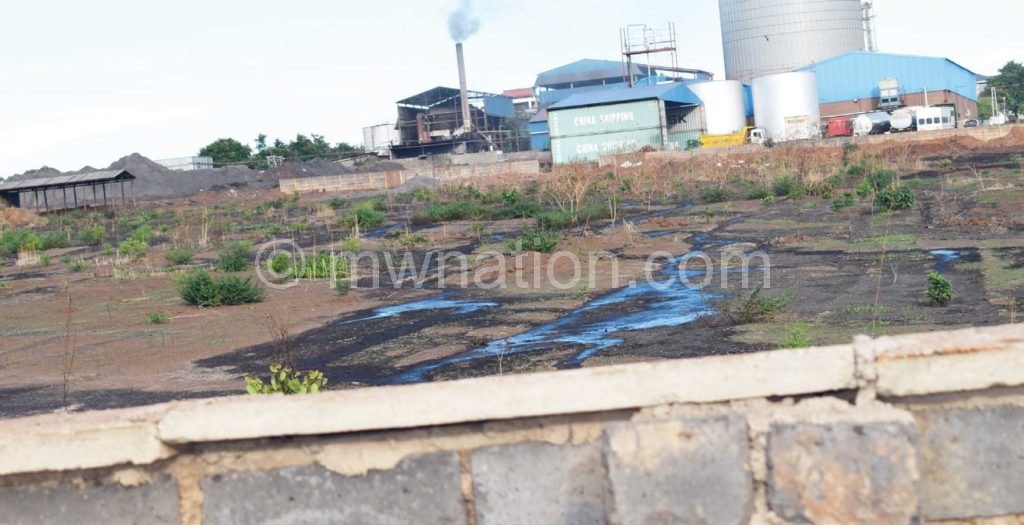Condemned to waste horror!
It is as if the 14 families in Gongweya Village, near Kamuzu International Airport in Lilongwe, were sentenced to six years ‘imprisonment’ among toxic factory waste, a putrid smell and hordes of flies.
On some days, the liquid waste from Sunseed Oil factory freely cascades over the village’s gardens and onward to Nafutsa stream. The discharge is a disaster which was supposed to be contained and confined within the company premises, according to waste management laws and rules.

The discharge is a health and gardening menace to people in Gongweya Village, as the liquid waste has over the years seeped into the ground and has polluted the water that people drink. Maize and other crops coming into contact with the polluted water wilt or dry up.
A solid-looking surface usually forms in the stream’s pools, often enticing goats, pigs and chickens to drown into it after it exhibits its quicksand-like ‘trap’ properties. Records indicate that dozens of livestock have drowned in the pools over the years.
But the people say their most painful daily experience is that the waste has a pungent smell complemented by a breeding ground for flies of virtually all types and sizes.
Looking livid with anger, village head Gongweya told this reporter that he feels so dejected by false hopes raised by research personnel, students and government officials “in the three administrations of presidents late Bingu wa Mutharika, Joyce Banda and Peter Mutharika”, whenever they visit the area.
“You are now one of those pretenders? Lucky you have come a few days after rainwater has diluted and washed away the waste that had stifled us in this area?
“Surely, you will not have a clear picture of the stench and the flies we have to put up with. We live under inhumane conditions and it is shocking that the government, the waste dumpers, the courts, Lilongwe City Council (LCC) and environmental activists have let us down big time,” said village head Gongweya.
He was referring to the fact that the community’s queries were given to the authorities from as early as 2013—soon after chicken-rearing, chicken feed-making and cooking oil factories were established near the village.
Gongweya explained: “When we first protested that the factory waste was spilling over to our community, the government temporarily shut down its operations and fined the owners K2 million. But they were allowed to re-open after they promised to dig waste dams and handle the waste from within the factory premises.”
He added that the spillage stopped for some time, but the villagers still engaged a lawyer who sued for compensation, since the polluted water made them sick and messed up their gardening.
But, he said the case has stalled since 2015.
The village head further explained that, by way of compensating the villagers, the waste dumpers were ordered to sink a borehole in the area, which they did in 2017. This, eh said, was after a public inquiry was conducted by Malawi Human Rights Commission (MHRC), involving the villagers, LCC, the Environmental Affairs Department (EAD) and the concerned company.
Gongweya Village Welfare Committee chairperson Liviness Mpanje, a mother of four children, said she and other committee members lament that their compensation case has stalled inexplicably.
According to the village welfare committee, the legal firm which they turned to tasked the compilation of a fact- based private firm, Water and Environmental Management Services (Wems), which came up with what may pass as a seven-page ‘smoking gun’ report.finding report to the Lilongwe-
The report is replete with photographs of how ‘rivers’ of oil waste and sludgy chicken-waste endanger and permeate into the lives of the people in villages such as Gongweya, Chakhutamadzi, Kanjira and Manyenje in the area.
The Wems report, made by an engineer who visited the area on September 3 in 2014, says the unfolding environmental disaster would be nipped in the bud if government and private environmental and health authorities were to act promptly.
It also notes that maize, bananas, sugar cane, potatoes, tomatoes and other vegetables, which could be grown successfully in the area in the past, now wilt and cannot produce or mature well, because of the water pollution.
Surprisingly, the stinging report has been gathering dust for four years now, because the case in court is getting nowhere.
MHRC executive secretary David Nungu confirmed that the Gongweya Village matter has been investigated and that the rights of the villagers to a clean environment, safe and clean drinking water and economic activity are being violated by the company discharging the waste on them.
He said the commission is concerned that the valid business licence in the area where three factories now stand was limited to chicken-rearing, and not oil production.
A senior Sunseed Oil executive, who declined to be named, confirmed that the matter has lingered on for many years and that lasting solutions are being sought. He said the company has met some of the promises it made over the matter.
But, later, the executive declined to give more details.
In an interview, LCC deputy director responsible for public cleansing services Catherine Kunje, explained that although the site is in Lilongwe Rural, the city council has been involved throughout, to try to bring solutions to the growing environmental horror taking place there.
“During meetings between the complainants and officials at Sunseed, Environmental Affairs, Lands and the city council, Sunseed officials were told what they needed to do. This included building robust containment gulleys and dams within their factory, to fully control the waste.
“Our expectation, by now, was that the advice was followed to the letter. But the continuing queries are proof that Sunseed Oil has not followed the advice fully and people are still being subjected to pathetic conditions,” she said.





